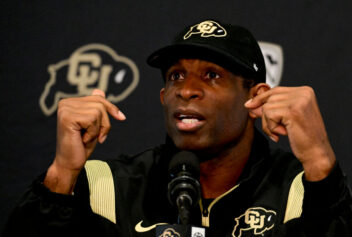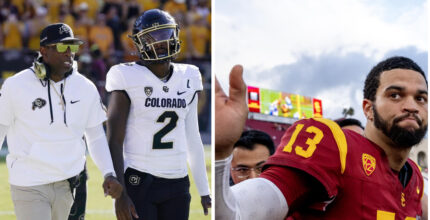With Deion Sanders officially leaving Jackson State University to become the head coach at Colorado University, a rift now exists between those lamenting his departure and others who understand his calling.
Welcome to Colorado, Coach Prime 🤝#GoBuffs | @DeionSanders pic.twitter.com/LHJ22ylvFP
— Colorado Buffaloes Football (@CUBuffsFootball) December 4, 2022
From the beginning of his journey in collegiate athletics, Deion Sanders said he was on a mission as a college coach. That task was always multi-faceted, like Coach Prime himself, and what was experienced first was its initial iteration. Jackson State and the HBCU football landscape became a crusade for Sanders, who knew his confidence, football acumen, and electric smile would jumpstart the conversation about former top-tier NFL players giving back to underserved elements of the football community.
Sanders delivered on that promise in more ways than one, steering top Division I prospects to his little nook in Mississippi and de-committing Travis Hunter from Florida State to Jackson State. Additionally, in the post-protest movement era, he maintained the national dialogue around a commitment to HBCUs that started in basketball and lives now in football. Jackson State University was the immediate beneficiary, but his propulsion of the Southwestern Athletic Conference (SWAC) into the national dialogue is phenomenal.
Deion sanders tells his Jackson state football team he has officially accepted the job as Colorado next head football coach pic.twitter.com/0XviDdcem4
— Shannonnn sharpes Burner (PARODY Account) (@shannonsharpeee) December 4, 2022
The Sanders Effect
The Sanders effect is infectious, and now that he has raised the vibration of the HBCU athletic system, he revealed that he has other mountains to climb in pursuit of a level playing field.
“It’s been four or more African-American head coaches at the next level that have been terminated,” Sanders said when he announced his decision to take a head coaching position at Colorado University. “I haven’t heard not one other candidate like myself to replace them. To me, that’s a problem that many don’t think about. If someone don’t step and step out and hold it down for us there’s a problem.”
If Deion Sanders leaves Jackson State & takes Shedeur, he proving folks right. Deion was preaching elevating HBCU programs & looks like he was just using JSU as a launching pad for his coaching career, which is fine, but don't go around acting like it was for altruistic reasons.
— Ashton Morris (@ashtonmorris1) December 2, 2022
That crusading sentiment powers Deion Sanders and defines the Coach Prime ethos. He is knocking down barriers for athletic descendants of the Diaspora one field at a time. Sanders’s next challenge is to replicate his efforts on the Division I level, to set a standard that will allow other Black coaches to have staying power in D-I football.
Sanders is fashioning his next move as a Jackie Robinson-level monumental moment, called up from the HBCUs to the collegiate majors. Still, many who love what he represents for the plight of Black colleges are not pleased with his departure.
Coach Prime meeting the team for the first time @DeionSanders pic.twitter.com/PlCPRAkALq
— Barstool Colorado (@CUBarstool) December 4, 2022
“Many detractors, I guess they don’t understand college football consists of 70 percent African-American,” Sanders continued. “I don’t care where you’re at, there just happens to be more at an HBCU. But it’s not like I’m not going to speak into the lives of African-American men and women alike because my challenge is to still provoke change no matter where I am.”
Official statement from Deion Sanders on his decision to leave JSU for the University of Colorado: pic.twitter.com/MizLuFS7u6
— Jonathan Rizk (@OfficialRizk) December 3, 2022
“You Can’t Please Everybody” — Kendrick Lamar, “Crown”
The Jackson State University Tigers clinched the football program’s second consecutive SWAC championship with a convincing 43-24 win over rival Southern. It was the moment between that Sanders told his team that he had to take the Colorado job.
During halftime, the band announcer laid down a mockery that would be indicative of the split Sanders will now have in his captive audience of HBCU supporters.
Southern's band announcer chose violence at SWAC Halftime today. Deion news had JUST broke and buddy had that in the clip ready to go. 🤣🤣🤣🤣 pic.twitter.com/J8wt6lOdd5
— Roy Wood Jr- Ex Jedi (@roywoodjr) December 4, 2022
“Two-Four-Six-Eight, let’s get country like Jackson State. Hey Jackson sounds like you need to get to be getting ready for a new head coach. How come your coach don’t want you no more?” the MC laughed. “I told y’all he wasn’t SWAC. Coach Prime is about to be big balling.”
Unfortunately for Sanders, there is a polarization between starting a job and bringing attention and success to an HBCU program, and leaving the long-term process of upgrading HBCUs to make waves in a larger pool. This is why his pivot to Colorado is so monumental, even as some are willing to indict him for what they might feel is a Black college movement he is abandoning too soon.
It hurts that Deion Sanders left JSU for Colorado but I can’t complain about black coaches not getting chances then getting upset when they accept the rare opportunity. HBCU coaches almost never get consideration for these types of vacancies. So best of luck to @DeionSanders
— Steve Wyche (@wyche89) December 4, 2022
“The thing that alarms me the most is just because I’m leaving Jackson they think that I’m leaving African-Americans,” Jackson said at a press conference after his first meeting with his new team. “I don’t know if you noticed or not but I’m Black. I can never leave who I am or what I am or how I am or how I go about being that. So it is still my task to look in that locker room and see 65-70 percent of African-American men trying to help them get to the next level as well as all the others.
“My calling is for young men, young women and people of all walks of life, all social climates and all ethnicities. That’s my calling. My calling is not built on a location it’s built on a destination.”
Deion sanders is amazing 😂💯 pic.twitter.com/n19DK4Vxp7
— Shannonnn sharpes Burner (PARODY Account) (@shannonsharpeee) December 4, 2022
Deion Sanders knows how to shift the athletic tides from Prime Time to Coach Prime, and his biggest test will be to maintain the love created by the community many will perceive he is abandoning.



